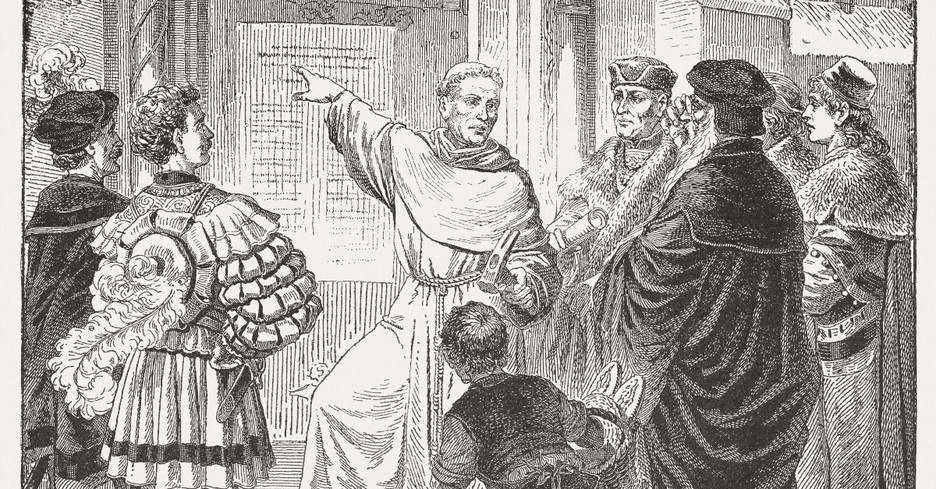
These events represent some of the major developments in 16th-century Christian history, with the Protestant Reformation, the Catholic Counter-Reformation, and the religious conflicts of the era being central themes.
16th Century Christian History
1517: Martin Luther's Ninety-Five Theses
- Martin Luther, a German monk, posted his Ninety-Five Theses on the door of the Wittenberg Castle Church, critiquing the sale of indulgences and sparking the Protestant Reformation.
1521: Diet of Worms
- Martin Luther was summoned to the Diet (assembly) of Worms by Holy Roman Emperor Charles V, where he refused to recant his teachings, leading to his excommunication from the Catholic Church.
1525: Peasants' War
- The Peasants' War in Germany, inspired in part by Lutheran ideas, resulted in a violent rebellion against feudal lords and the Catholic Church.
1529: Protestation at Speyer
- Protestant princes and representatives protested against the Catholic majority at the Diet of Speyer, leading to the term "Protestant" being coined to describe those who protested against the Catholic Church.
1534: Act of Supremacy in England
- King Henry VIII of England declared himself the head of the Church of England and separated from the authority of the Pope in Rome.
1545-1563: Council of Trent
- The Council of Trent, convened by the Catholic Church, addressed issues raised by the Protestant Reformation and implemented various reforms within the Catholic Church.
1555: Peace of Augsburg
- The Peace of Augsburg allowed each prince in the Holy Roman Empire to choose either Lutheranism or Catholicism as the official religion of their territory, acknowledging religious pluralism.
1572: St. Bartholomew's Day Massacre
- A massacre of Huguenot (French Protestant) leaders occurred in Paris during the French Wars of Religion, leading to widespread violence and conflict.
1588: Spanish Armada
- The Spanish Armada, sent by Philip II of Spain, attempted to invade England to restore Catholicism but was defeated by the English navy.
1598: Edict of Nantes
- King Henry IV of France issued the Edict of Nantes, granting religious toleration and rights to French Huguenots, effectively ending the French Wars of Religion.
Late 16th century: Jesuit Missions
- The Society of Jesus, or Jesuits, played a significant role in missionary work, education, and counter-Reformation efforts within the Catholic Church.
Late 16th century: Witch Hunts
- The late 16th century saw an increase in witch hunts and trials across Europe, often carried out by both Protestant and Catholic authorities.
In our progression century by century through church history, we come to the tumultuous 16th century and the explosive influence of the Reformation. A couple of years ago in preparing our Christian History Institute video curriculum, Reformation Overview* I was privileged to visit all the major Reformation locations where the original events occurred. People and issues I had read about came to life for me in an unforgettable way. Day after day I was gripped by the adventure of stepping back into the world changing convictions and issues faced by the great Reformers. Several impressions left a lasting mark upon me.
The posting of the 95 theses by Luther in 1517 was not the beginning of the Reformation but in many ways a culmination of widespread developments that had been building up for generations.
There was not one Reformation but many. Luther, Zwingli, Calvin, Tyndale, the Anabaptists and others were all distinctive centers of dynamic development and spiritual renewal.
The intellectual discipline of the major Reformers was prodigious. These leaders were almost without exception devoted to careful scholarship. Compare this to the kind of leaders we so often exalt today, based more on the attraction of personality and media charisma than the quality of their thought.
We are familiar with the big names in the movement, but all of them had their circle of colleagues and close confidantes with whom they struggled, debated, agonized, and prayed. Luther had his Melanchthon, Zwingli his Bullinger, Calvin his Farel, Tyndale his Frith.
Major reformation events often took place in little out of the way places far removed from the centers of influence. Luther's Wittenberg surely was no Rome. Even today it is so small we couldn't find a hotel in town. Calvin's Geneva was not a major international city when he went there. It became one because of what he did there. --Ken Curtis
• The printing of books begun in the fifteenth century now develops swiftly, propelling the spread of the Reformation.
• Michelangelo, Albrecht Durer, Raphael, and Lucius Cranach create art with Biblical themes.
• 1517 Martin Luther posts his 95 theses at Wittenberg which stir Germany and Europe in a matter of months.
• The Scriptures become more available for the common person as Luther translates into German and Tyndale into English in the 1520's.
• The Protestant Reformation spreads throughout Europe with Zwingli in Switzerland, the Anabaptists in central Europe, and John Knox in Scotland. Henry VIII's quest for dynastic security causes him to separate from Rome and establish himself as head of the Church of England. John Calvin's ministry in Geneva and his Institutes begin a Scriptural reexamination of theology and society.
• The Counter-Reformation defends traditional Catholicism against Reformation ideas. The Council of Trent (1545-1563) reaffirms Catholic doctrine. The Jesuit order becomes the defender of the Catholic faith and begins sending missionaries abroad.
• Religious convictions produce martyrs among both Catholics and Protestants -- Sir Thomas More, William Tyndale, and Thomas Cranmer among the many executed. Huguenots in France begin to be persecuted. Foxe's Book of Martyrs (actually titled Actes and Monuments) records the persecution believers in Christ have endured through the centuries.
• In England, Puritans begin to fashion a church more closely based upon the Scriptures.
Photo: ©Getty Images/ZU_09

.jpg)
